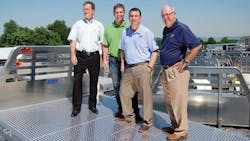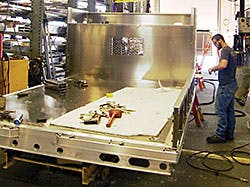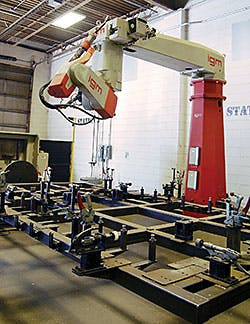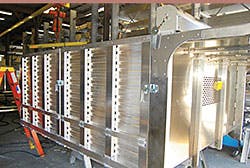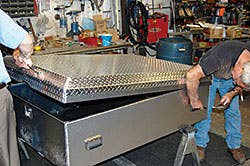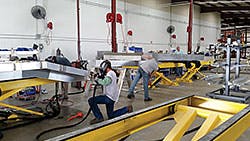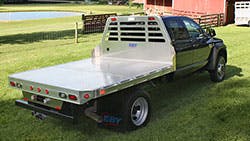To meet increasing demand, Eby opens new facility, buys new machinery, hires new VP, takes aim at the market
MENNO and Travis Eby hate saying “no” to customers.
And that’s something they have had to do in recent years to those seeking custom aluminum truck bodies from M H Eby Inc, which is based in Blue Ball, Pennsylvania, and has plants and sales and service locations in West Jefferson, Ohio, Story City, Iowa, Logansport, Indiana, Seymour, Indiana, and Worthing, South Dakota.
“We could have sold a lot more truck bodies this year if we had them,” says Travis, who took over as president in 2011, while Menno, his father, remains CEO. “Well, it’s a good problem to have. But in a way, it isn’t. We’re finding that people are looking for alternatives, so if we can’t do it, somebody else is going to. Was it frustrating? Sure. You work hard to build your name and to get that customer, and then when you can’t provide for them, yeah, that hurts.
“The problem has not been in towing bodies. It’s not in our robotic line. Our challenge has been in the landscape and dump bodies that are more labor intensive. We simply ran out of capacity. A lot of landscapers here in Lancaster County plow snow in the winter. Well, it was a plentiful harvest of snow this past winter. So we had a lot of landscapers looking to update equipment, and we had a couple of large fleets we were selling to. We missed selling to the customers who were buying one, two, three units and needed them right away. You want to please everybody, so it’s frustrating when you literally can’t get enough equipment out the door to satisfy that market.”
There shouldn’t be any problem this winter. Eby has made a $2 million investment and opened a 35,000-square-foot facility one mile east of its Blue Ball plant in East Earl—devoted primarily to aluminum truck-body production, but also aluminum equipment trailers and Eby’s new line of aluminum gooseneck trailers—and expects to double its truck-body production in 2015.
Standing in the new facility, Menno scans the floor and says, “The boot-up of the new plant has happened very quickly. We just signed the lease in May. But the planning process, laying the groundwork, and putting all the right pieces in place has been under way for quite some time. We wanted to be in a position to move rapidly once the right facility became available.”
Adds Travis, “We’ll be better prepared this year, not just for local markets but also for our distributors. That’s one thing we heard from distributors: ‘Your lead times are too long.’ ”
Eby also created a new position—vice president of sales and marketing for truck bodies—and hired Charlie Horton, an industry veteran who most recently led the business development group for Morgan Olson.
It was a slam dunk for Horton, who had always been impressed with Eby’s lean corporate profile with a high emphasis on products and relationships with customers.
“They have all the building blocks for a terrific business and needed someone to help grow that business,” he says. “This is definitely not a company where they brought a fireman in to save a section. This is a thriving business that needs an extra oomph.
“There’s a terrific opportunity here. We have a fantastic skill set in terms of custom truck bodies. We see people come in and say, ‘My business is different. I have this particular need for this vocation.’ They describe it in loose terms and we take it from concept to prototype to product very rapidly. Our engineering group is tremendously successful at taking a customer’s goals and translating it into a truck body that works. My job is to take that skill set and take us from a product line we’ve succeeded in—just from customers beating a path to our door—and expanding the sales approach and building new product lines.
“We have tremendous customer satisfaction. Customers are very happy with the product they get—its quality, longevity, and usefulness in their business. We just need to get the word out to more and more customers about what we can do. It’s a terrific company with a good background and skill set.”
How will he do that?
“We will utilize and leverage our key strengths,” he says. “We have a fantastic flatbed aluminum towing product that’s well known in the business and is offered at a terrific price point—a product that can be used by a lot of different industries. Then, with some of the custom individual products we build in the landscaping business, there’s a tremendous demand for specific application-oriented truck bodies. It’s a huge industry, and each company in the landscape business has a little but different focus, and therefore needs a different tool. We have to translate that into a product line that goes to market.”
Then there’s the burgeoning oil and gas industry. The Marcellus Shale has proven to be a fertile fracking ground in northeastern and southwestern Pennsylvania, with 59 operators and 6391 active wells. The boom over the past five years has created high demand for trucks and equipment to service the wells.
“They are expanding and have a need for support trucks that really hasn’t been tapped—or has been tapped by niche companies with outdated technology,” Horton says. “We’re going to focus on any sort of equipment service vehicle with flatbeds, ladder racks, toolboxes, hose reels. Don’t get me wrong: We’re not in the hydraulic pump business. That part of those trucks is not what we would do. But those vehicles require flatbeds with different structures built around them. We can build the required safety equipment. Those are the ways we can be a part of that business.
“I think we compete very well. We have a degree of customization that a lot of large manufacturers can’t meet. But we have the high quality and high repeatability and confidence of our customers that a lot of manufacturers would love to have. There has to be that value proposition communicated that this is not going to be the cheap-product entry at all lines, but if you look at the life cycle and what you get out of the product, the total cost of ownership is lower.
“We serve customers who say, ‘My needs are unique. I have this special job I have to get done during the day. Help me make a more efficient tool for my people.’ I think that’s something we do tremendously well.”
In business for over 75 years
Eby was started in Blue Ball in 1938 by Menno’s father, Menno H Eby Sr. The company started out by manufacturing wood and steel livestock bodies, and that’s largely what drove the company when it moved to the current facility in 1984. But trailers largely replaced livestock truck bodies as customers’ preferences shifted to a trailer that could be pulled by a pickup truck.
“We entered the fifthwheel livestock trailer market in ’78, and through the ‘80s, things started to shift,” Menno says. “We still built livestock truck bodies, but we built one of them to 50 livestock trailers. So we were always a truck body company, the majority being livestock bodies. Dad switched the business to aluminum and we started making grain bodies.”
Eby’s switch to aluminum construction came well before many body builders or chassis OEMs had even considered it. Working successfully with aluminum requires different tools and skills than steel, and many body builders chose to stick to steel. With over 30 years’ experience in aluminum craftsmanship, Eby finds itself well-equipped to serve a market that is demanding lower truck body weights to drive higher payloads and save fuel.
Building aluminum trailers created a ready market for Eby in aluminum truck bodies, according to Travis.
“We had customers come to us and ask us to start making flatbeds,” he says. “A guy would buy an F-350 or F-550 to pull his gooseneck trailer and needed a platform to essentially cover the tires so it could be a towing body. We started making those towing bodies in the early 1980s. That was just a complimentary product to go along with the livestock trailer. To this day, we still have customers buy a livestock fifthwheel trailer and a nine-foot platform to put on their towing vehicle.
“Sometime in the ‘90s, we realized, ‘Hey, this is a good market all on its own, this platform towing body thing.’ We started focusing on that. The landscapers and contractors started taking notice. It took us some time, but we realized, that we had all the key components to build a thriving aluminum truck-body business.
“In the past 10 years, our body business has really grown to the point where we really felt needed to bring someone in at the senior level. Charlie was the first person we ever hired at the VP level. We brought him in to come to work every day thinking about truck bodies and how to grow our truck-body business. It got to the point where our existing management team couldn’t give it the focus it needed and knew it was something we needed to grow.”
Eby might have been able to expand its main facility to accommodate a new truck-body manufacturing area, but navigating the maze of permits would have been more difficult and time-consuming than finding a nearby facility that was already set up for manufacturing.
“We’re getting landlocked,” Travis says. “We don’t have extra space, and there are a lot of regulations on expansion, especially in our area. We’ve got the Chesapeake Bay watershed, and we have to be careful with runoff. It’s a long process to expand here. This facility was available. The real issue was more about time. We’d much prefer that it be attached to our main building, but time was not on our side with that option, so moving to a facility just up the road was the second-best option.”
Eby put in a new LED lighting system, installed some ramps, and enlarged some of the bay doors, but the building didn’t need any major renovations. The key was what the company put in it. Eby brought its IGM robot from the main facility and expanded it from three to six stations, and also purchased a new Emmegi five-axis CNC milling machine.
“We’re not buying yesterday’s tools and putting them a new warehouse,” Horton says. “We’re buying sophisticated, cutting-edge fabricating equipment and putting it in a new facility.”
Says Travis, “You can do it on a small scale, making parts by hand, and we did that for many years. But to meet industry demand in a meaningful way, it requires automation. Our towing-body business has doubled since we put the robot in. It’s really made a big difference and facilitated getting significant fleet deals we wouldn’t have had the capacity to build. We will further its utility in the new facility because it will have larger footprint and we’ll be able to use it on more of our product line. We’re excited about that. Then there’s the new five-axis machine center. It has a 15x50 footprint, so it’s a really big machine that can do a lot of work to aluminum extrusions that traditionally we did by hand or had to send out to a machine shop. So we’re going to have that in our own capability to do a lot of neat things to a piece of aluminum. That’s going to really help us.”
Easier through machinery
Horton says that while joining metal sounds like a simple thing, it’s quite complex if it’s done beyond simple rectangles and in shapes customers want. These two machines will allow Eby to make products it didn’t even conceive of five years ago.
“We’ll be able to take custom extrusions and machine them and make them go together in a way that’s not only aesthetically pleasing but is repeatable,” Travis says. “It’ll be better construction. It’s made by a machine. We can dial up the part number and make the same part again. With parts that are made by hand and fit together by hand, if you take a 12-foot piece and it’s off by an eighth of an inch, a good craftsman can take the next part and make it work. But if a customer needs service down the road and he’s 1000 miles from here and the part doesn’t fit, you have to find a craftsman in your locality that can do it. We like the idea of being able to order up a part number, and we can ship that customer a part that’s going to fit.”
Says Horton, “As your ability increases to craft to greater and greater tolerances and you’re into hundredths of inches rather than eighths of inches, that leads to the customer interacting better with his truck and more ergonomic parts. His experience of having a tool he can work with every day goes way up. So we’re continuing to set the bar higher and higher and our fabricating ability translates into better products for the customer.”
The new machinery also will help Eby expand its toolbox production.
“We’ve made them for years and got to the point where we kind of felt, ‘We don’t want to make toolboxes. We’ll buy somebody else’s and focus on truck bodies,’ ” Travis says. “But we found that demand was so high for specialty boxes and special sizes. It’s difficult to get others to make them. We have all the machinery to make good boxes. Demand is so high that we realized we were being forced into the toolbox business, so we might as well be good at it.”
Some truck bodies will continue to be manufactured at the main facility. Installations are done there, so Eby doesn’t want to build large bodies at the new facility that would have to be moved back to the main facility, thus adding cost to the product.
All truck bodies in the company are built in Lancaster County, but the other facilities will benefit from decreased lead times.
Eby inventories truck bodies at all six company-owned facilities. The facilities in Indiana and South Dakota provide sales and service. The facilities in Pennsylvania, Ohio, and Iowa provide sales and service, but also do manufacturing—livestock trailers in Ohio and livestock trailers, with a focus on large semi trailers, in Iowa.
“We want to have national distribution,” Travis says. “We sell truck bodies all over the country, but our strength is definitely in the eastern half of the US.”
To achieve that, the work is never done. Eby is also expanding the Ohio facility, which Travis says is long overdue.
“We’ve got a lot of balls in the air,” he says with a laugh.
Good thing they’re proficient at juggling. ♦
About the Author
Rick Weber
Associate Editor
Rick Weber has been an associate editor for Trailer/Body Builders since February 2000. A national award-winning sportswriter, he covered the Miami Dolphins for the Fort Myers News-Press following service with publications in California and Australia. He is a graduate of Penn State University.
